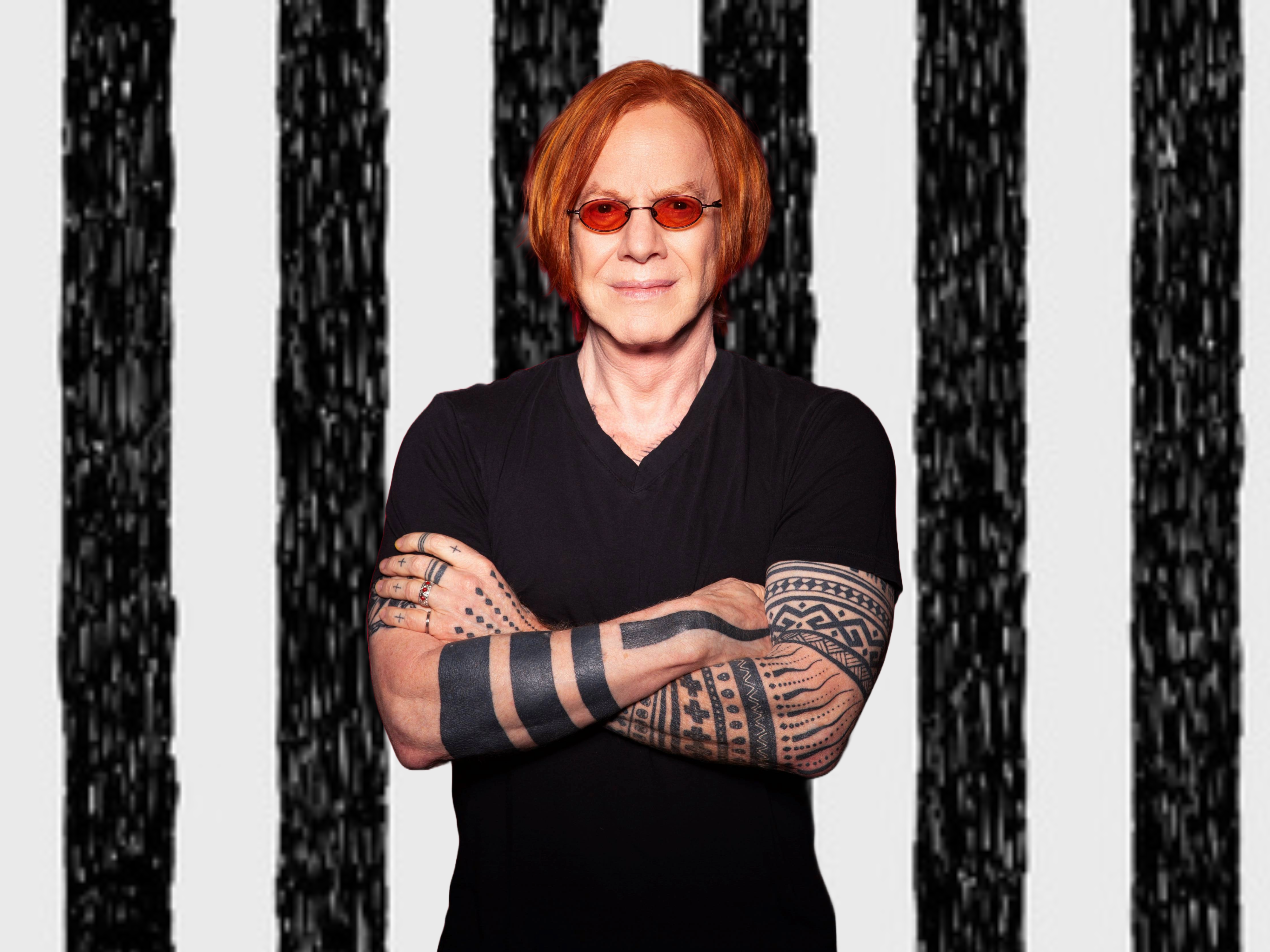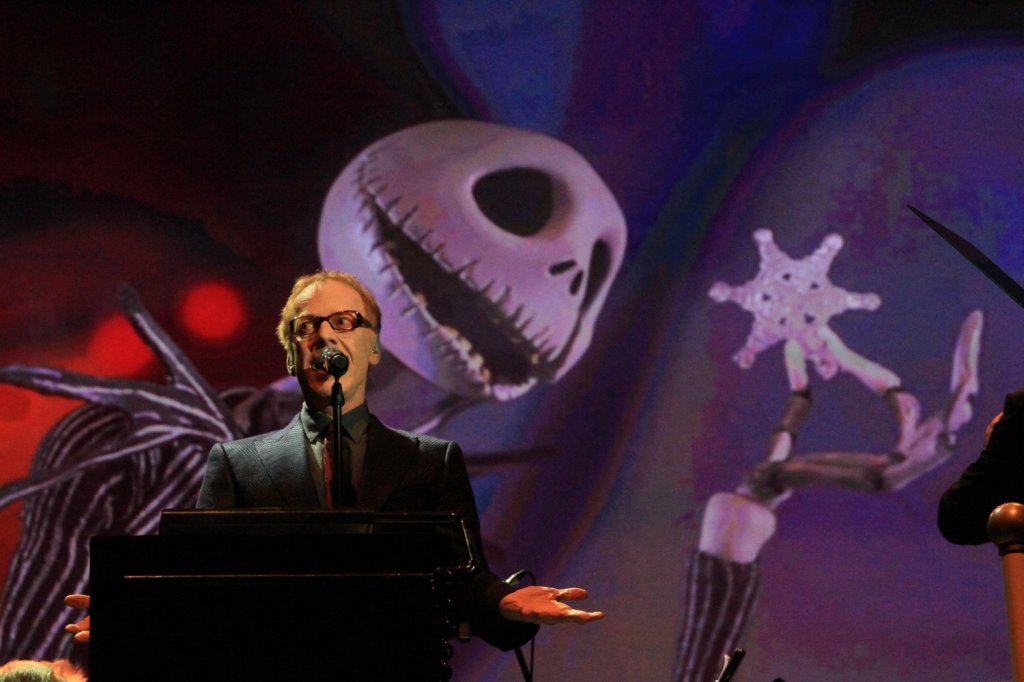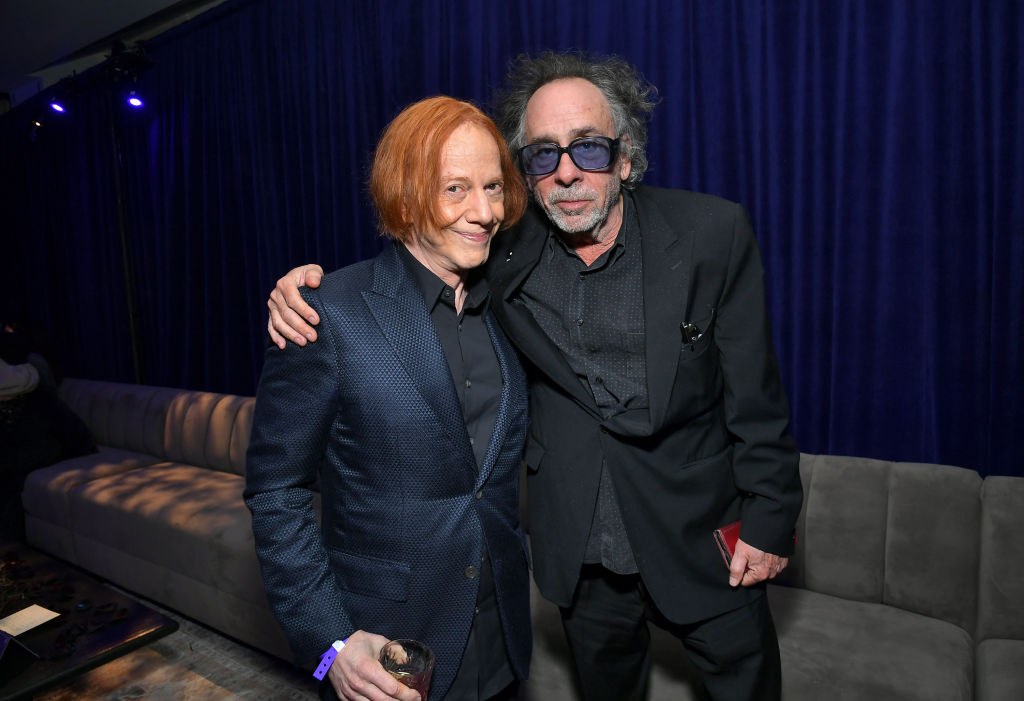
Courtesy of Phoenix Symphony

Audio By Carbonatix
The films of Tim Burton and their musical scores by Danny Elfman go together like dark, mysterious peanut butter and magical, haunting jelly.
For 40 years, Elfman’s ethereal choirs, whimsical horns and moody strings have added an irreplaceable layer of magic to Burton’s work, including “Batman,” “The Nightmare Before Christmas” and “Beetlejuice.”
Though former Oingo Boingo frontman Elfman is a wildly prolific composer with nearly 150 television and film credits who has worked with many big names in Hollywood, Burton is his most frequent collaborator. It’s that association that is the focus of two Phoenix Symphony performances this weekend.
Elfman will join the symphony on Saturday, Oct. 11 for its annual gala. Then on Sunday, Oct. 12, at 2 p.m., the symphony will perform suites from a number of Burton’s films with featured performances by Elfman. Extremely limited tickets remain; cost starts at $247 plus fees.
We recently spoke with Elfman about working with Burton, his composing process and what attendees can expect this weekend. The interview has been edited for length and clarity.

Courtesy of Phoenix Symphony
Phoenix New Times: We’re excited that you’re coming to Phoenix for the annual Phoenix Symphony gala and a public performance the next day. What can people expect at those performances?
Danny Elfman: They could expect me to play a beautiful violin solo.
Really?
No, I’m just kidding.
I didn’t think so. I was just going to roll with it.
Well, I mean, I don’t know to say what to expect. I’m a modest performer. I never say something too much about my own self other than I’m going to do the very best I can. But in terms of the symphony and the performance, I mean, I hope they’re in for a really fun night of the suites of music.
In each of the suites, I try to both choose the most recognizable elements that people who are fans of the film want to hear, but also to include something in there that’s a personal favorite of mine that is not quite as obvious. And with about eight or nine of them, to include a little bit of fresh improvisation on the themes that they’ve never heard before. To me, that just makes it a little more interesting than just playing main title, main title, main title. You know what I mean?
Sure! That’s exciting. I’ve seen clips on social media of you singing “What’s This?“ with an orchestra. Could we perhaps look forward to that?
Generally, I’d be singing about five songs, actually. It’s for the “Nightmare Before Christmas” suite. There are two versions of it: one when the show goes on and I’m not there, and then when I am there, we do an altered suite or I’ll sing a number of songs from the show.
Walk me through, if you would, how Danny Elfman composes a film score. Where do you begin?
Well, I guess there’s a number of levels. Right now, I’m in the middle of a film for Sam Raimi, and it starts out generally with a rough cut. I’ll see the film for the first time. It’s unfinished, but definitely assembled enough to get a sense of the beginning, the middle and the end. And I’ll start working with that and getting ideas. Then I’ll wait for the director to feel like there’s a little more confidence that this is getting close to finished. Then really, I’ll just start writing.
I’ll look for scenes that reflect the major thematic points in the movie. It’s almost like I’ll pick some of the biggest moments first — not necessarily biggest like the loudest, but biggest in terms of: This piece helps define the tone of the score. Because the most important thing for me in the beginning is figuring out the tone. What is the tone of this movie? Is it a little more theatrical? Is it more stark? Is it more minimal? Is it more romantic?
It’s kind of hard to explain. I’m trying to think of the best way to explain it. Every film has kind of an attitude or a tone that the director needs the audience to understand. The music helps bring the audience into that moment. In other words, is this going to be serious, or is it a little tongue-in-cheek, or is it kind of romantic? And what is the tone? Are we saying in the music that there’s questions that are unsolved or are we saying, no, what you see is just what we want you to feel? Is there a misdirection and we’re going to misdirect the thinking, like something is about to happen, but then something else happens? All these questions get resolved in the music with the director.
Once I get through those big kind of tonal questions, then I just go back to the beginning and I just start going scene by scene trying to get it all in order. Right now, for example, I’m about halfway into the (Raimi) film, maybe a little more, and it all is piecing together like a puzzle making sense. And then occasionally there’ll be a scene I need to clarify with the director: What do we want the audience to think here? Because that’s kind of what film music is all about: What do you want the audience to feel at this moment?
That’s so interesting. Have there been any instances where you and a director sort of disagree on that fundamental tone or where to place a cue or things like that?
Well, it’s not so much disagreeing, but there is definitely a huge effort going into the exploration of finding that because sometimes, the director has to find it, too. It’s kind of like a journey that we’re taking together in terms of: I’ll provide a lot of choices and then they’ll go, oh wow, if you play it this way, it’s making me think of this. But I don’t know if I want to go that far in that direction. Then, I’ll try two other things. Sometimes, the director’s very clear on what the tone is and you just have to find it. And then when you find it, they go, yes, that’s what I’m looking for. Sometimes it’s a journey that you take together. And my job is to help provide them with all the options and things they need to feel confident that this is the direction we’re going.

Charley Gallay/Getty Images for Netflix
That’s very cool. So the Phoenix Symphony performance is dedicated to your work on Tim Burton’s films, and obviously, he is your most frequent collaborator. What about Burton has made you work with him over and over again, and how has your professional relationship developed over the decades?
I would say that over the years, he’s gotten more involved, whereas in the beginning, he would just kind of get more of a sense of, yes, I like where that’s going, just go ahead and run with it. And now he’s more likely to get involved moment to moment. But I never totally know what to expect. Tim is not predictable. Even after, I think, I can’t remember if “Beetlejuice Beetlejuice” was our 17th or 18th film together, but even after 40 years, he is probably the most unpredictable of all the directors I work with. He’s an interesting, totally unique person. I never quite know what to expect from him. He’s full of surprises for me.
That’s great. Our friend Wikipedia tells me that you described the first time you heard your music played by a full orchestra as one of the most thrilling experiences of your life. We’re obviously way past that by now, but does it still thrill you to hear your work performed live?
It does, really. I mean, there are things that never change. The first time I heard my music played was the bicycle race in “Pee Wee’s Big Adventure.” And of course, that had a unique awesomeness because I’d never been in front of an orchestra before and it was just a stunning moment. But I’m still blown away because I write some rather difficult music for orchestras, according to what they tell me.
The amazing thing about orchestras with film music is that they’ve never seen anything before. They’re going to track to track, and they’re seeing it for the first time when they open Page 1 of whatever we’re starting with. And sometimes, they’ll open with a big cue. … The fact that they read through it as good as they do never ceases to amaze me. I can’t tell you how many times, even recently, I’ll be sitting there with my orchestrator Steve Bartek for 40 years now, and we’ll look at each other. They’ll play something really difficult through, first-time sight-reading, and it’s already 75% correct. And we look at each other going: How did they do that? It never ceases to amaze. It’s like, are they human?
You took a very unconventional path to becoming a composer for film and television. Do you have any advice for someone looking to break into that line of work?
I talk with students — film and music students — all the time. I actually really love doing it. And what I always tell them: The most important thing is perseverance. Because every successful composer that I’ve ever met, if you listen to their story, there was some lucky break somewhere for them in their career where they were in the right place at the right time. And the trick is to keep yourself going, but when that moment arrives, you’re ready. And with actors, there’s a lot of disappointments at first. There’s a lot of actors who have to go through auditions and the disappointment of being turned down. And with composers, it’s like waiting for that chance, that opportunity of somebody going, yes, I’ll give you a shot.
It just takes a tremendous amount of perseverance and not getting discouraged, which is easier said than done, as you know. But that’s a real important element.
A couple of rapid-fire questions as we’re running out of time. What is your favorite film or television score that you have composed?
I don’t have a favorite film. I have to say. There’s moments of different films that I’m particularly fond of. So I mean, there are films where the experience for me is really special, but that doesn’t mean it’s necessarily my favorite score. But I look back super-fondly toward, let’s say, “Edward Scissorhands.” “Nightmare Before Christmas” was very unique and special because I put so much of myself into it. And so that will always be way up there on the list. But there was a cue in a film I just did for Luc Besson just a couple of months ago called “Dracula: A Love Tale,” and it’s like, oh my God, this is one of my favorite things. So favorite things will pop up all over the place.
What’s your favorite film score that you did not compose?
Oh my God, so many. “The Godfather” would be way up there. “Lawrence of Arabia” would be way up at the top. Oh, I could make lists and lists of like, God, I’d have killed to have scored that film. Starting with “Bride of Frankenstein,” 1933, I think. I love that. The first two film scores, “King Kong” and “Bride of Frankenstein” — like wow, can you imagine getting to be one of the first people to ever do a film score? That’s wild how you approach it. But of course I love a big canvas, and so there are many films that, like the ones I mentioned, are just big emotional canvases and that’s what I most long for.
Is there anything else you’d like to add about your upcoming Phoenix shows?
I just think for anybody who loves film music and especially has a fondness for Tim’s movies, they’re going to find this a really fun concert. And I am very happy and proud of the fact that it’s been playing all over the world, and it’s so much fun when I can be part of it and attend it. So I’m just looking forward to seeing the Phoenix audience and I think they’re going to have a great time.